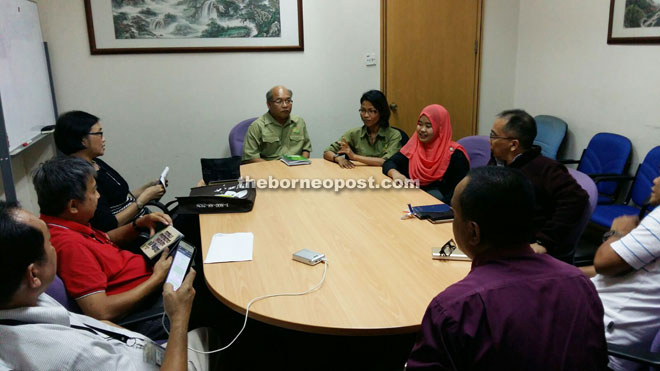More steps taken to minimise human-crocodile conflict as it is hard to relocate the reptiles

Francis (fourth left) and other SFC officers in a discussion with senior officers of The Borneo Post and Utusan Borneo.
KUCHING: Sarawak Forestry Corporation (SFC) is stepping up its operation to monitor the movement and density of crocodiles in known infested river networks across the state, as measures to reduce human conflicts and minimise incidents of attack.
Its corporate communications manager Francis Gombek said the agency could only monitor the presence of crocodiles while constantly reminding the local community to be more vigilant and cautious in crocodile infested waters.
He said this is because the species is protected under the Convention on International Trade of Endangered Species of Flora and Fauna (CITES) Appendix I – which states that no export of crocodiles taken from the wild is allowed.
He added that relocating crocodiles from areas with high density of human population is a difficult process as in most cases the reptiles would be able to find their way back. One of the solutions, he said, is to relocate some of the species to crocodile farms but at the moment, the state only has two CITES-registered farms – in Miri and Kuching.
“To minimise conflicts in human-crocodile interactions, we are continuously monitoring the river networks. When incidents of crocodile attacks occur, we will immediately go to the site to investigate. We will study the scenario before deciding on the appropriate action.
“Normally we would advise the local community to take extra precaution and be more vigilant when using the rivers,” he said when making a courtesy call on The Borneo Post senior management here yesterday.
He also said crocodile sanctuaries and habitat such as Pasir Pandak, Pasir Panjang and Santubong can be developed as tourism destinations.
Although protected under the wildlife law, Francis pointed out that killing of crocodile is allowed as stated under Section 41 and 42 of the Wildlife Protection Ordinance 1998, provided human safety is under threat.
Last Monday, SFC’s swift wildlife action team (SWAT) launched a seven-day operation to remove and cull crocodiles at Pasir Pandak, Pasir Panjang and Santubong, which was prompted by a recent crocodile attack at Kampung Santubong.
The state government had declared public or recreational areas such as waterfronts in big towns across the state including beaches at Pasir Pandak, Pasir Panjang and Santubong as Crocodile-Free Zones (CFZ) since the beginning of last year.
In 2013, 10 crocodile attacks were recorded, with seven fatalities. The following year saw three fatalities from seven attacks while last year, 12 cases of crocodile attacks resulting in eight fatalities were recorded.
Representatives from the state presented a proposal to CITES Secretariat during the Animal Committee Meeting in Tel-Aviv, Israel to down-list estuarine crocodiles in Sarawak into CITES Appendix II, which allows regulated harvests and export of crocodiles taken from the wild.
The request will be made known in the coming CITES Conference of Parties scheduled to be held in South Africa this September.
Present at the meeting were The Borneo Post editorial director Phyllis Wong, senior managing editor Francis Chan, chief reporter Churchill Edward, head of special desk Peter Sibon, Utusan Borneo chief reporter Saibi Gi and editor Sulaiman Bujang.
Francis was accompanied by SFC communications executive Sitty Dilailah Ibrahim and corporate affairs executive Melissa Omar.
